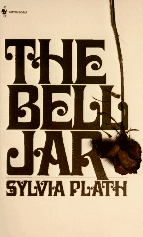The Bell Jar

The Bell Jar

A profoundly personal and striking work, robert Scholles of the New York Times said "The Bell Jar" was, "The kind of book Sallinger's Fanny might have written about herself 10 years later, if she had spent those 10 years in hell." The corollary to Salinger fits. The style of 'The Bell Jar' is close to Salinger's type of stream of conciousness with horribly deeper implications. With statements such as, "I felt now that all uncomfortable suspicions I had about myself were coming true, and I couldn't hide the truth much longer." Plath leaves the reader destitute in the land of chronic depression.
The book chronicles Plath's summer interning with a famous women't magazine, her later electro-shock therapy, her subsequent decent into madness, suicide attempt, then slow recover. On Plath's suicide attempt Plath's first words after she was found by her mother and regained conciousness were, "That was my last act of kindness." The book itself is laden with hopelessly depressive statments like, "everything people did seemed so silly, because they only died in the end."
Plath actually vigorously opposed the publication of 'The Bell Jar' in the US on the grounds that the highly personal aspect of the book would decimate people who were close to Sylivia in her life and during her downward fall that led to her first suicide attempt. Yet when 'The Bell Jar' was published posthumously in 1971 in the US, it was an instant success. 'The Bell Jar' could easily be subtitled, "An artist's trek through oblivion", for the simple fact that the artist in the story, 'Esther Greenwood' at one point sucked every reason out of life for living, leaving herself searching for a release, the release Plath of course temporarily, then permanently found with her suicide attempts.
The image of the bell jar is used by Plath as a metaphor for the lens through which the mad person views the world. The lens which distorts and misshapes whatever personal reality one has and shields the mad person from the rest of the percievable universe. Plath refers to herself in 'The Bell Jar' as, "The negative of a person I'd never seen before in my life."
